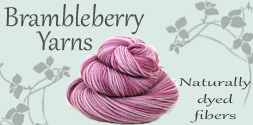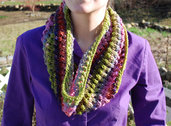I had previously applied an alum mordant to both the wool yarn and the scarf.
……………
To make the dye, I first mashed up the berries before adding them to my pot of water. I then brought this berry mixture to just under a simmer for about 30 minutes. I was very careful to not get the dye bath too hot as this would make the berries a more tannish color due to the tannins being released. I allowed this berry stew-like mixture to cool overnight before I strained it and added it back to my dye pot.
I then added my wet fibers to the dye bath and turned the heat on slowly. As soon as the dye bath was just under a simmer I turned off the heat and allowed my fibers to stay in the dye pot for a full 24 hours before removing them and rinsing them.
……………
As you can see the silk scarf really took up the color of the blackberries. It is such a rich shade of plum. It amazes me how much it looks just like the blackberry juice stains you get on your hands from picking berries! The wool yarn is also a lovely shade of purple. It is not quite so vivid and maybe a tad bit more gray but still beautiful nonetheless.
All in all, I am very pleased with the results I achieved and will definitely be using blackberries to dye with again. This would even be great for children to attempt seeing that the berries are rather easy to gather and collect.
If you try this out yourself be sure to let me know (or better yet send me a picture!) I love to hear about everyone’s natural dye adventures.

















{ 18 comments… read them below or add one }
I don’t dye. Yet. I am sure with a few years I will be! I just wanted to say how lovely everything is! Well done!
That is a beautiful color! What a great use for not-so-edible berries. My mother used to save onion skins from red onions to dye wool.
What did you use for a mordant? Blackberries are not acidic enough by themselves to make a colorfast dye.
As stated in the post, I used an alum mordant and have had very good results with this method. I have some yarn that is several years old and still has maintained it’s color.
So lovely. What a great way to use those berries.
That’s really cool! Can’t wait to give it a try!
Just love the lilac of your wool – took a look at your blackbean dyeing too – fascinating!
After enough blackberry stains from summer days i’m surprised I didn’t make this connection sooner. lol it’s such a great color.
as with jazelle, i can’t believe i didn’t make the connection earlier! how brilliant!
How very interesting!
I don’t do anything with yarn but I’m so fascinated with everything!
So cute tutorial! thanks for sharing.
That is so inspiring! I recently took an acid dye class, but I’m yearning to try natural dyes. Thanks for sharing your results!
I just wanted to say how lovely everything is! Well done!
I’m curious how the color is holding up?
Most of the dye artists I know say blackberries will quickly fade gray, particularly in sunlight.
I get a similar color using lichen. (Care in harvesting, they grow slowly. Just take a bit from a rock, don’t pull off where it attaches, and look for broken pieces on the ground thereabouts.) I soak it in 1/2 ammonia and 1/2 water for many weeks. The dye bath exhausts well, meaning it gives repeated color, each bath a lighter shade then the previous. No mordant needed, and I’ve always adjusted the ph of the dye bath to neutral with baking soda before dyeing to protect the fibers.
Hi Rebecca,
I’m actually surprised because the color on the yarn is still holding up really well. I expected to see some fading myself. I am keeping it out of sunlight so maybe that has a lot to do with it retaining its color so nicely. The silk on the other hand is retaining its color wonderfully and it gets well used too by my daughter. She stole it from me for her dress up play and has not returned it.
What type of lichen do you use? I have only experimented with Old Man’s Beard (Usnea) and achieved tannish golds with it. The lichens are such fascinating stuff!
SCRumptious!! I’d love to try dyeing.
Thank you Erin. You should try dyeing– it is so much fun and really rewarding!